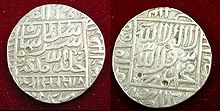Sur Empire
[3][4] The Sur dynasty held control of nearly all the Mughal Empire territories along the Indo-Gangetic Plain, from eastern Balochistan in the west of Indus River to modern-day Rakhine, Myanmar in the east.[5] Sher Shah Suri's relentless campaigns on the Bengal Sultanate prompted its ruler to request aid from Humayun, who in turn mobilized a Mughal army in July 1537, and advanced to Chunar.The siege of the fort at Chumar would last over six months until it finally fell despite the attempts from Rumi Khan to make quick work of the city.However, as this was happening, Sher Khan drove deep into his territory, seizing Bihar and Varanasi, while also recovering control over Chunar, and laying siege to Jaunpur, with other detachments of the Afghan army extending as far as Kannauj.Sher Shah mobilized an army and lead it himself, defeating Khijir Khan and restoring Bengal under his suzerainty.Bengal was divided into 47 smaller administrative divisions, appointing them under a shiqdar, which would be oversighted by Kazi Fajilot as the chief supervisor of the Muqtars.[20][21] Not longer after, Sher Shah entered conflict with the Gakhars, who had always been difficult to subjugate, and caused issues amongst former rulers in the region.Sher Shah marched through the Punjab and subjugated the Gakhars, laying waste to much of the countryside and taking many prisoner.After gaining the submission of Abul Qasim Beg, the Mughal wali of Gwalior, The Afghans continued their march to Sarangpur.Qadir Khan, the ruler of the Malwa Sultanate, being abandoned by his vassals who refused to support him, begged for the mercy of Sher Shah, who treated him well.If Almighty God would vouchsafe me a recovery from this fever I will return with all speed, and Puran Mall who has enslaved the families of the Muslims in Chanderi and has made dancing girls of their daughters and did not accompany my son Qutab Khan — him will I so punish that he may be a warning to others.Jalal Khan led the Afghan army, reaching Vidisha, where he merged forces with Sher Shah.The treaty observed the points that: Free passage to himself [Puran Mall] and his family with their belongings, The retirement of Sher Shah to a distance of two marches from the fort, and Adil Khan and Qutab Khan to bind themselves by solemn oaths that Puran Mall and his family will not be molested in any way.He has slain our husbands and our daughters he has enslaved, and made dancing girls of them, and has seized our lands, and all our worldly goods for a long time past.[27]Upon hearing this, and further seeing the ruined families of Muslim survivors, Sher Shah was reported to have tears dropped from his eyes, and his idea of the destruction of oppression overtook him.During this, a certain raider named Fateh Khan Jat looted the routes between Lahore and Delhi, which surmounted to numerous complaints in return.Instead of marching to the enemy's capital Sher Shah halted in the village of Sammel in the pargana of Jaitaran, ninety kilometres east of Jodhpur.[33] After one month of skirmishing, Sher Shah's position became critical owing to the difficulties of food supplies for his huge army.[34] After this victory, Sher Shah's general Khawas Khan Marwat took possession of Jodhpur and occupied the territory of Marwar from Ajmer to Mount Abu in 1544.[38] The Sur dynasty held control of nearly all the Mughal territories, from Balochistan in the west to modern-day Bangladesh in the east.[42] The Rupee is today used as the national currency in India, Indonesia, Maldives, Mauritius, Nepal, Pakistan, Seychelles, and Sri Lanka.Caravanserais (inns) and mosques were built and trees were planted along the entire stretch on both sides of the road to provide shade to travelers.Shiqars were tasked with the responsibility of civil administration, and themselves could field 200-300 soldiers to maintain law and order in their districts.[50][51] According to Srivastava, Sher Shah's balance made his fellow Muslims content with his lenient treatment of Hindus.Sher Shah's evaluated policy was seen that Islam should hold supremacy over the lands he had conquered, but not to displace Hinduism.Sher Shah invited Afghans from across the empire and gave them high positions, with himself taking interest in recruiting troops.[56][57] The reputation of Sher Shah was formidable in this regard as a just ruler, to the point where merchants could travel through and sleep in deserts without fear of being harassed by bandits or robbers.[60] Amongst his magnitude of reforms while consolidating the empire, Sher Shah Suri abolished taxes that were held on the borders of provinces.




Sher Shah SuriEmpireSasaramHindaviPersianBengaliBhojpuriSunni IslamAbsolute monarchyAdil Shah SuriBattle of SirhindMughal EmpireBengal SultanatePortuguese EmpireMalwa SultanateLangah SultanateRajputanaHistory of IndiaTimelineMadrasian cultureSoanianBhirranaLahuradewaMehrgarhIndus Valley CivilizationPost Indus Valley Period(Cemetery H Culture)Vedic civilizationKuru kingdomEarly Vedic periodRise of Śramaṇa movementLater Vedic PeriodSpread of Jainism – ParshvanathaSpread of Jainism – MahaviraRise of BuddhismBrihadratha DynastyHaryanka DynastyShaishunaga DynastyNanda DynastyMahajanapadasClassicalMaurya DynastyPandya DynastyShunga DynastyKanva DynastySangam periodKushan DynastySatavahana DynastyGupta DynastyEarly medievalPallava dynastyChalukya DynastyHarsha's DynastyKarakota DynastyArab InvasionTripartite StrugglePratihara dynastyRastrakuta DynastyPala DynastyChola Dynasty2nd Chalukya DynastyLate medievalDelhi SultanateMamluk DynastyKhalji DynastyTugluq DynastySayyid DynastyLodhi DynastyPandyan EmpireVijayanagaraMughal DynastyBengal SubahMaratha EmpireCompany RajKingdom of MysoreSikh EmpireThe Great RebellionBritish Raj Independence MovementIndependent IndiaDominion of IndiaRepublic of IndiaTimeline of Indian HistoryDynasties in Indian HistoryEconomic HistoryLinguistic HistoryArchitectural HistoryArt HistoryLGBT historyLiterary HistoryPhilosophical HistoryMusical HistoryEducation HistoryCoinage HistoryPaper Currency HistoryScience and Technology HistoryList of Inventions and DiscoveriesMilitary HistoryNaval HistoryWars involving IndiaPashtunsCultureDiasporaDiscrimination against PashtunsList of PashtunsLanguageTribesEmpires and dynastiesKhalji BengalKhalji DelhiLodi DelhiKarraniTaymanisDurraniBarakzaiAfghannorthern IndiaIndo-Gangetic Plaineastern BalochistanIndus RiverRakhine, MyanmarChunarFathabadBattle of ChausaBattle of KannaujHumayunMughal army
